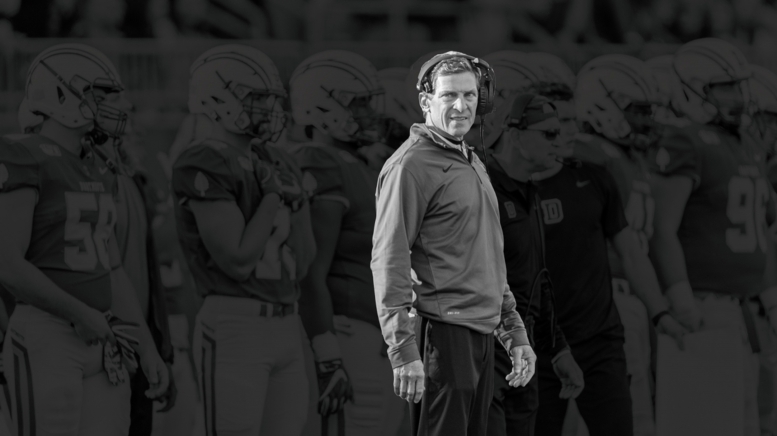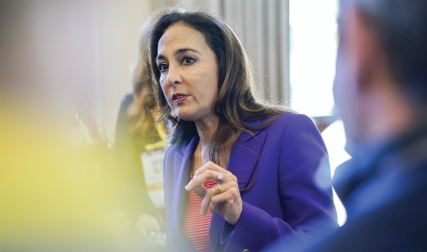Buddy
Thank you for the moving tribute by David Shribman ’76 to coach Buddy Teevens ’79 [“His Life Was a Gift,” November/December]. It likely brought a tear to many an eye; it did to mine. Many of his legions of friends have said that Buddy “bled green.” Indeed, he did. And many have said that he leaves an inspiring “legacy.” He does. But most have missed the link: Buddy bled green because he was a legacy. His father, also named Eugene Teevens, was class of 1952. Bedtime lullabies no doubt included: “And if I had a son, Sir, I’d tell you what he’d do: He’d yell ‘To hell with Harvard’ like his daddy used to do!”
Godspeed to Teevens, truly a son of Dartmouth.
THOMAS A. BARNICO ’77
Westwood, Massachusetts
To celebrate my 50th reunion in the summer of 2016, my wife and I visited Hanover to tour the campus. We wandered into Thayer Dining Hall, which I had not seen in 25 years and in which I had toiled in the dish room during all my semesters at the College. As we stepped into the lobby, we found Teevens standing in front of us—awaiting the arrival of a football recruit. Without hesitation he engaged us in conversation. When I explained my connection to Thayer, he launched into an excited recitation of how it had been so much improved since the 1960s—and then he led us on a mini-tour of the new facility.
All this kindness and enthusiasm delivered to strangers he had just encountered. One of the best things to ever happen to me on the Hanover Plain—and a reminder of Teevens’ all-encompassing embrace, across time and distance, of the essence of Dartmouth fellowship.
DAVE TUCKER ’66
San Francisco
I deeply regretted the news of Teevens’ death. I met him when he was a lecturer on a Dartmouth-Princeton alumni cruise in the Caribbean in 2019. He was an inspiring speaker there, and his love and dedication to his players (and their physical well-being), not just as means to football victories but also as people whose enduring futures he wished to advance, came through loud and clear.
Having learned I was a retired Foreign Service officer, he sought my contact data so that one of his players with an interest in diplomacy could contact me. Teevens was an eager competitor, but he knew that sports is one part of a broader liberal education and that his ultimate duty was not to “winning, whatever it takes,” but to the future lives of the students in his charge.
MARC E. NICHOLSON ’71
Washington, D.C.
Seen and Heard
We are members of the Dartmouth Asian Pacific American Alumni Association (DAPAAA) subcommittee on Asian American studies, and we write to express our gratitude for the cover and feature story on the fight for Asian American studies at Dartmouth [“The College Has No Asian American Studies Program. Why?” July/August].
The struggle to establish such a program at Dartmouth has spanned decades. Despite extensive efforts since the 1990s, most Dartmouth alumni—within and beyond the Asian American Pacific Islander (AAPI) community—are not even aware of this ongoing effort for a more equitable and representative curriculum. The article counters that invisibility by making us more visible, literally. We have heard from DAPAAA members that the article makes them feel “seen,” and both AAPI and non-AAPI classmates have told us that the article has been “very educational.”
We appreciate in particular the article’s headline. This is the question our community has been asking for decades and the question that, once answered, will help us create a stronger and more inclusive Dartmouth.
We also particularly applaud the inclusion of the voices of alumni, students, faculty, and the administration alike in the article, given that creating a sustainable program at Dartmouth will require the consistent and dedicated efforts of all these stakeholders together.
Thank you for covering important stories such as this, which reflect the diversity of the Dartmouth community.
ARIEL XUE ’08
Asian American Studies Subcommittee,
Dartmouth Asian Pacific American Alumni Association
Washington, D.C.
Beyond Belief
Thanks for “Common Ground” [November/December]. In a polarized era, Kate Cohen ’92 and Molly Baskette ’92 have modeled refreshing, respectful dialogue. What’s missed is the potential for harmony and collaboration when God is not rigidified into something or someone to “believe in.” When an interviewer asked Carl Jung if he believed in God, he said, “I don’t need to believe. I know.” Jung’s implication is that we can know transcendence as a source of awe, surprise, imagination, peace, even healing, without necessarily designating an anthropomorphic deity.
When humanity finds a transcendent way to respect cultural and religious diversity, we will have found the “perennial religion” that Aldous Huxley and Robert Bellah prophesied could evolve the species. Twentieth-century Thornton Hall luminaries such as Hans Penner, Robert Gimello, and Fred Berthold are to be thanked for alerting us to religion’s potential to steer us to harmony when we are careful with our definitions of divinity.
We may then even be able to expose and transcend the idolatrous faith-driven Trumpian death cult exposed by English professor Jeff Sharlet in “Dispatches from the Fringe” [November/December], and rebuke other “true believers” for their arrogant and ignorant justifications for unholy wars.
MICHAEL CALDWELL ’75
North Wolcott, Vermont
Well Done
I appreciated the tribute by Ty Burr ’80 to Richard Dohanian, chef and owner of the long-gone Bull’s Eye Tavern on South Main Street [“Kitchen Socrates,” November/December]. I worked as a waitress there around 1983-84. Ty hits the nail on the head in his descriptions of Richard. An important detail was that Richard attended the “Great Books” program at St. John’s College in Annapolis, Maryland, after his time in the service—hence the piece’s title. Richard and I bonded over this as both my sister and a cousin attended St. John’s. It was a pleasure to work at The Bull’s Eye. I still aim to make baked potatoes taste as delicious as the ones he fed the staff at the end of the night.
PAM TALLEY ’85
Evergreen, Colorado
I’ve enjoyed Ty Burr’s writing over the years in his capacity as a movie critic. His piece on The Bull’s Eye Tavern suggests he should be a restaurant critic as well. He captured the ambience, locale, food, chef, waitstaff, and customer base, as well as his younger self and the era, in delightful detail and evocative prose. The sentence about the burger “swaddled like the Christ child in a beer-and-cheddar sauce that was the Platonic ideal of the orange caulk they put on nachos at the ballpark” is, like its subject, somewhat overstuffed, and may not have passed “mustard” with the imbibing English profs at the tavern, but it did induce in me a simile-smile.
As for “In the spring of 1981, I left Hanover for the rest of my life,” it sounds like the opening line of a novel, as well as of a life, indeed virtually all our lives. One can’t go back to college again, however frequently one visits Hanover. Though immune to nostalgia, I derived great pleasure from Ty’s bull’s-eye resurrection of that place and time. Anyone who hasn’t read this trip down South Main Street and memory lane should rectify their mis-steak.
LENNY WEISER-VARON ’78
Hingham, Massachusetts
The Undertow
Chelsea Edgar’s “Dispatches from the Fringe” [November/December] ostensibly records the struggles of a professor who immersed himself in the “Trumpocene,” but the actual message is that Trump Derangement Syndrome is real, and that afflicted faculty are passing this mind-virus to students. Coaxing them to be more open-minded in dealing with people with different viewpoints, the professor explains to students that “what’s scary about a monster—a werewolf, a vampire… is that it’s part human.” Are you curious why Dartmouth graduates feel ennobled shouting down a valedictorian or how the College can justify canceling invited speakers at the last minute? Do you question why Dartmouth suddenly has one of the worst free speech rankings in the country? Edgar’s story provides some clues.
BENJAMIN WILEY ’84
Singapore
Perspective is an interesting thing and needs to be considered in any reading and evaluation of an article like the one about Sharlet. He talks about “every pregnant person who’s dying for lack of reproductive rights right now,” and yet there is no mention of the hundreds of thousands of aborted human beings. Shocker.
JOHN LALLIS ’69
Gladstone, New Jersey
Brave and Talented
Thank you for honoring the memory of Echo Brown ’06 [“The Lives They Lived,” October e-newsletter] as well as for her profile “Resonance” [March/April 2017]. She will always remain one of the most talented, fearless, and hard-working students I ever had in a drawing class and was also one of the most courageous people in life. My husband, the late Gary Lenhart, worked extensively with her in writing classes at Dartmouth, and in subsequent years read manuscripts for her two novels and was delighted by her one-woman show. Even in the throes of her own illness, she made an extremely moving contribution to Dartmouth’s online memorial for him.
Echo was smart, witty, honest, generous, resilient, determined, and enormously brave. Though her background offered few advantages, an extraordinary life force propelled her into remarkable achievements. It was Dartmouth’s privilege to contribute to her education. Her untimely death is a terrible loss.
LOUISE HAMLIN
Professor Emerita of Studio Art
Norwich, Vermont




